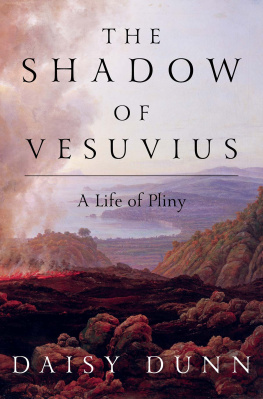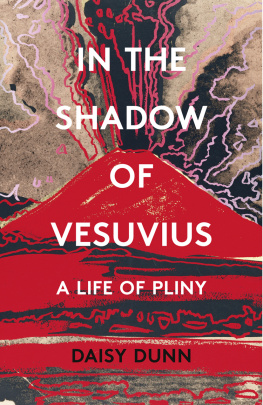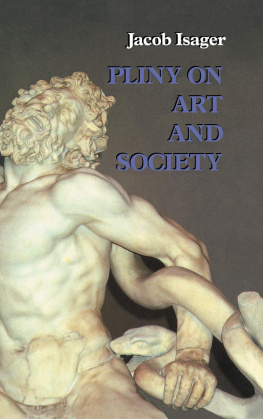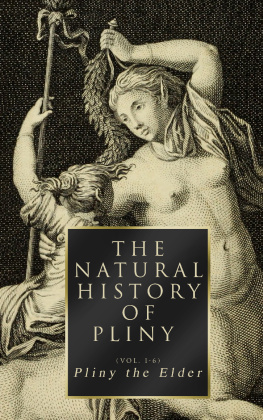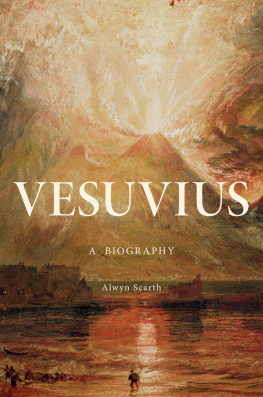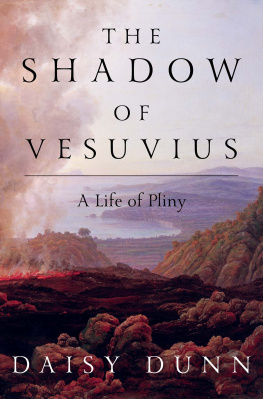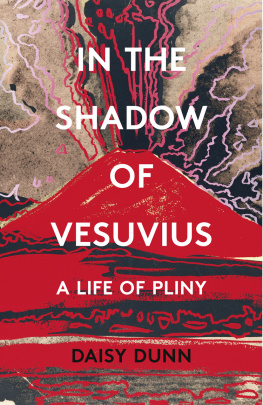
THE
SHADOW
OF VESUVIUS
A Life of Pliny
Daisy Dunn

LIVERIGHT PUBLISHING CORPORATION
A DIVISION OF W.W.NORTON & COMPANY
Independent Publishers Since 1923
New York London
For my grandparents, Don and Wendy Short



T his book explores the ways in which the Plinys Younger and Elder thought about life, death and the natural world. At its heart is a biography of the younger, better-documented Pliny, whom I have pursued through his Letters together with his uncle Pliny the Elders extraordinary encyclopaedia, the Natural History. It is also a celebration of the enduring appeal of both men, their work and the treatment of their ideas through the passage of time.
Reading the Letters and Natural History in Latin is very involving and requires much to-ing and fro-ing between sources from Roman histories to satires; from ancient Greek poetry and medical tracts to the writings of the Church fathers. Among Pliny the Youngers regular correspondents were the historian Tacitus and biographer Suetonius, whose celebrated accounts of the emperors post-date his letters by a number of years and supplement several of his descriptions of events in Rome. There are also a good many surviving but largely forgotten inscriptions and archaeological remains which are relevant to the lives of the two Plinys. I have brought these together with the literary sources in order to provide a three-dimensional view of the world from which they came. All translations from the Greek and Latin are my own, unless indicated otherwise.
In the spirit of both Plinys, I have eschewed a strictly chronological narrative and followed rather the seasons of the Youngers life, while drawing on the Natural History throughout. The shape of the book gives a flavour of Pliny the Youngers year, which was structured slightly differently from ours. Julius Caesar had reformed the calendar in the first century BC because it had fallen out of step with the seasons the discrepancy caused by the fact that it was based on the cycle of the moon. Caesar had it replaced with a solar calendar. There were now twelve months divided into thirty or thirty-one days each, with the exception of February which, as today, had twenty-eight, or twenty-nine every leap year. Although Pliny the Elder confessed that there was still little exactitude in ascertaining the proper time for a star to appear, or in marking the beginning of a new season when change is so gradual and weather so unpredictable, the Julian Calendar offered a stable framework. Pliny the Elder had winter begin on 11 November, spring on 8 February, summer on 10 May and autumn on 8 or 11 August.

Lucky, I think, are those men with a god-given gift for doing what deserves to be written about or writing what deserves to be read and very lucky are those who can do both. Through his own books and yours, my uncle will be one of these.
Pliny the Younger to Tacitus, Letter 6.16
T he crisis began early one afternoon when Pliny the Younger was seventeen and staying with his mother and uncle in a villa overlooking the Bay of Naples. His mother noticed it first, a cloud, both strange and enormous in appearance, forming in the sky in the distance. Pliny said that it looked like an umbrella pine tree, for it was raised high on a kind of very tall trunk and spread out into branches. But it was also like a mushroom: as light as sea foam white, but gradually turning dirty, elevated on a stem, potentially deadly. They were too far away to be certain which mountain the mushroom cloud was coming from, but Pliny later discovered it was Vesuvius, some thirty kilometres from Misenum, where he and his mother Plinia were watching.
The cape of Misenum was famous for its sea urchins and even more so for its harbour, which was home to one of Romes two imperial fleets. Triton, son of the sea god Neptune, drowned him in his envy. It was in the course of gathering wood for Misenus funeral pyre, in the volcanic region of Cumae, that Aeneas discovered the golden bough that secured his entry to the Underworld.
Pliny the Elder, Plinys maternal uncle, was admiral of the fleet, in charge of maintaining and fitting out the boats which served predominantly as protectors of the seas off Italy. On the morning the cloud appeared, he had risen early as usual, bathed, lunched, and was working when, at around midday, his sister came to tell him what she had seen. Abandoning his reading and calling for his shoes, he made his way to a higher vantage point for a better view.
Pliny the Elder was a historian and a naturalist as well as an admiral. He had recently finished writing his thirty-seven-volume encyclopaedia on natural history, a few passages of which were concerned with the worlds volcanoes. He had described Mount Etna in Sicily glowing through the night and covering in frost the ash it ejects when snow lay over its surface. If Pliny the Elder knew it was a volcano at all, he thought it was extinct.
He gave the impression that the region of Campania was too Lucky Campania, mused Pliny the Elder, was where Nature had gathered all her gifts.
The grapevines were especially famous. An ancient wall painting from the region shows the wine god Bacchus, dressed in a handsome bodysuit of grapes, surveying the vines on the lower slopes of a mountain in all likelihood Vesuvius itself. An enormous snake, the Good Spirit of vineyards, is depicted in the foreground of the painting. It was by snapping off these long, trailing vines, weaving them into ladders, and lowering themselves onto a plain beneath the slopes of Vesuvius that Spartacus and his men had managed to launch a surprise attack on the Romans, drive them back, and take over their camp during their uprising in 73 BC.
Admiral Pliny had the entire fleet at his disposal and launched the quadriremes large, but surprisingly swift ships equipped with two banks of rowers, two men per oar with the intention of bringing help not only to Rectina, but to as many on that populated shore as he could.
For several hours, the fleet held course across the Bay of Naples. Despite heading in the very direction whence others were now fleeing, Plinys uncle was said to have been so fearless that he described and noted down every movement, every shape of that evil thing, as it appeared before his eyes. By the time the quadriremes had come within sight of the coast, the pumice had formed island-like masses on the sea, impeding them from advancing any further. When the helmsman advised turning back, Pliny the Elder adamantly refused. Fortune favours the brave, he said.
Although the pumice prevented them from reaching Rectina, they determined to put in where they could. Stabiae, a port town just south of Pompeii, lay about sixteen kilometres from Vesuvius. A contemporary image reveals the towns harbour to have had long elegant promontories, criss-cross balustrades, sand-coloured pediments and towering columns crowned with sculptures of men. By the time the fleet arrived here, the columns would have been mere shadows, with evening falling across the bay.
Next page
